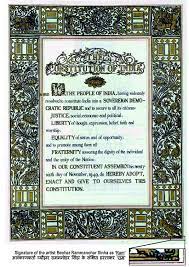Introduction to Preamble
The Preamble of the Indian Constitution is an introductory statement that outlines the fundamental principles and values on which the Indian Constitution is based. It is based on the objectives Resolution drafted and moved by Pandit Nehru and adopted by the Constituent Assembly.

We, the People of India
The Preamble begins with the words, “We, the people of India,” which reflects the democratic nature of the Indian Constitution. This phrase highlights that the power in the country rests with the people and that the government is of the people, by the people, and for the people.
Table of Contents
The Key Principles of the Preamble
The Preamble consists of a brief but comprehensive statement that encapsulates the essence of the Indian Constitution. It states that India is a sovereign, socialist, secular, democratic, and republic country.
Sovereignty
The term “sovereign” means that India is an independent nation, free from external control or influence. This section will explain what sovereignty means and how it helps India in its relations with other countries.
Socialism
The term “socialist” implies that the Indian government is responsible for the welfare of all its citizens.
Secularism
The term “secular” means that the Indian government treats all religions equally, and there is no official state religion.
Integrity
It is the practice of being honest and showing a consistent and uncompromising adherence to strong moral and ethical principles and values.
Democracy
The term “democratic” means that the power in the country is vested with the people, and they have the right to elect their representatives.
Republic
The term “republic” means that the head of the state is elected by the people rather than being a hereditary monarch.
In conclusion, the Preamble of the Indian Constitution is the soul of the Indian legal system. It outlines the fundamental principles and values that guide the country’s governance and shape its legal system. It is not just a mere introduction but a source of inspiration and guidance for the citizens of India.
42nd Constitutional Amendment Act, 1976
It has been amended once by the 42nd Constitutional amendment act, 1976 to add three new words Socialist, Secular, and Integrity.
Note: The American Constitution was the first to introduce Preamble.
Is Preamble a part of the constitution?
Berubari case (1960), the Supreme Court specifically opined that Preamble is not a part of the Constitution.
Kesavananda Bharati case (1973), the Supreme Court rejected the earlier opinion and held that Preamble is a part of the Constitution.
Hence, the current opinion held by the Supreme Court that the Preamble is a part of the Constitution, is in consonance with the opinion of the founding fathers of the Constitution.
However, two things should be noted
1. The Preamble is neither a source of power to legislature nor a prohibition upon the powers of legislature.
2. It is non-justiciable, that is, its provisions are not enforceable in courts of law.
Can Preamble be amended?
In the historic case of Kesavananda Bharati (1973), SC observed that Preamble can be amended, subject to the condition that no amendment is done to the ‘basic features’.
It has been amended only once so far, in 1976, by the 42nd Constitutional Amendment Act, which has added three new words—Socialist, Secular and Integrity—to the Preamble. This amendment was held to be valid.
Important Links